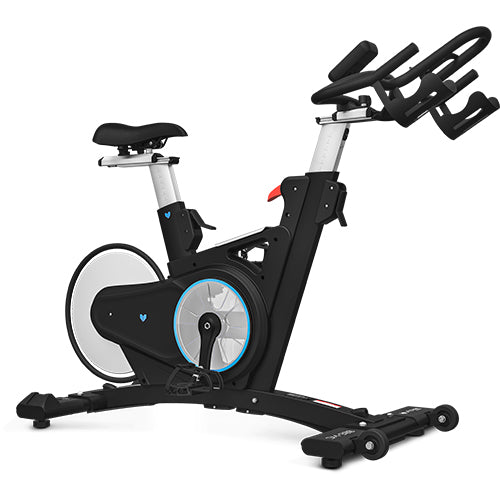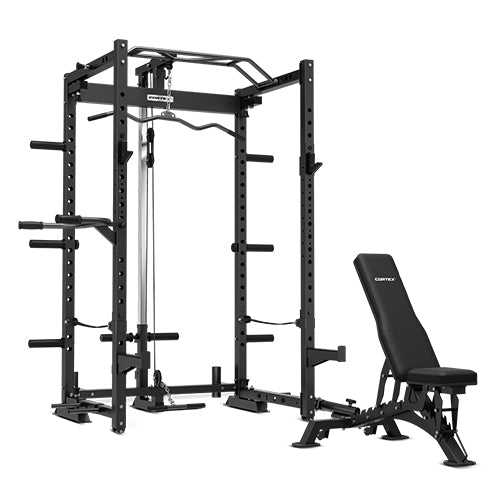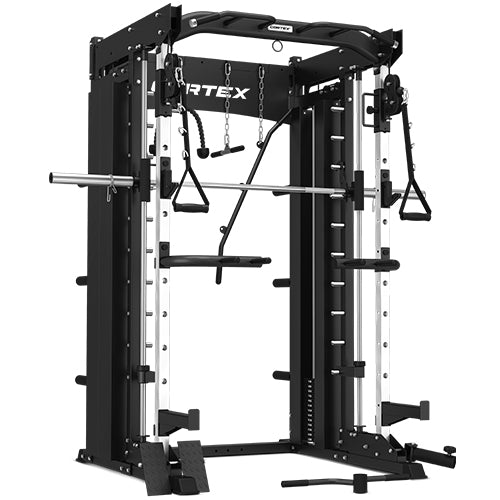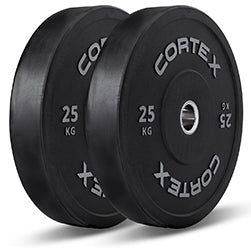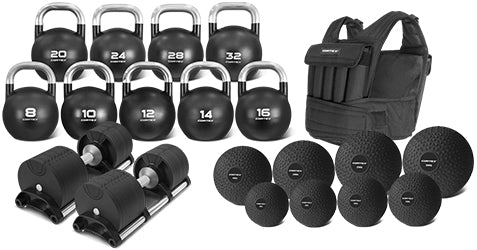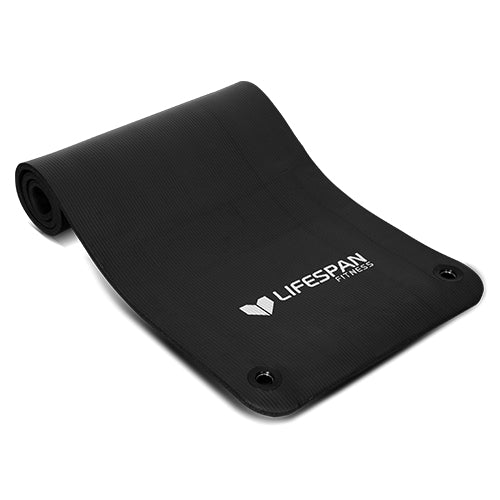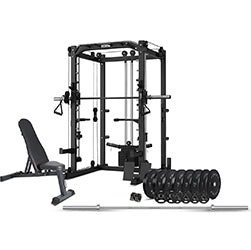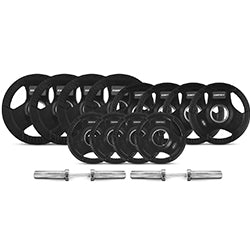

Runners are no strangers to the open road, the thrill of hitting new personal records, and the sense of accomplishment that comes with each kilometre conquered. However, to enhance their performance, endurance, and overall well-being, many runners are turning to a new ally in their quest for excellence: weight training. The incorporation of resistance training has gained popularity among runners of all levels, offering a host of benefits that extend well beyond the squat rack.
Understanding the synergistic relationship between running and resistance training will empower you to reach new heights in your fitness journey. Here we'll be covering the various advantages and giving you out tips for propelling your running prowess to the next level.
Increased Strength

One of the primary advantages of weight training for runners is the substantial increase in overall strength it provides. The strength gained from weight training translates into more powerful strides and a more stable core. Stronger leg muscles allow runners to push off the ground with greater force, resulting in longer and more efficient strides. A strong core provides stability and better posture, reducing the risk of injuries and enhancing balance during runs.
Weight training also enables runners to focus on specific muscle groups that are essential for their performance. While running primarily engages the lower body, weight training can address areas often overlooked during typical running routines, such as the upper body and core muscles. This helps address muscle imbalances, reduces the risk of overuse injuries, and can lead to a more enjoyable and productive running experience.
On top of this, the added muscle strength can reduce feelings of fatigue, making it easier to maintain a steady pace and endure longer distances.
Stronger Overall Body

Incorporating weight training into your running routine doesn't just result in increased strength, but it also contributes to a more robust and well-rounded body, which is particularly beneficial for runners.
Weight training helps build strength in various muscle groups, thereby reducing the risk of injuries. Strengthening muscles and joints helps maintain proper alignment during runs and provides stability to your body, lowering the chances of sprains, strains and overuse injuries. Runners often have areas prone to stress and injury, such as knees and ankles. Weight training can help by redistributing some of the stress from these areas to the strengthened muscles. This not only prevents injury but can also alleviate existing discomfort in these vulnerable regions.
Weight training can also help develop a strong core and back, contributing to better posture. Maintaining good posture while running is essential for efficient breathing, reducing the risk of muscle imbalances and enhancing overall running form.
Weight training can play a crucial role in the recovery process when dealing with running-related injuries. It helps maintain muscle mass and strength even during periods of reduced running activity, allowing you to bounce back more quickly and get back to your training routine.
By investing time in strengthening your entire body, you not only become a more resilient runner but also ensure that you're better equipped to handle the physical demands of your sport. Additionally, a strong and well-balanced body contributes to your overall health and quality of life beyond your running endeavours.
Better performance
Weight training leads to a stronger body, which directly translates into improved running performance. Stronger muscles, especially in the lower body, provide the power and endurance necessary to maintain a consistent and efficient pace throughout your runs. This increased muscular strength can lead to faster times and better overall race results. Muscles conditioned through resistance training are also more resistant to fatigue, allowing you to sustain higher levels of effort for longer durations. This can be a game-changer in distance running, such as marathons.
There is a symbiotic relationship between weight training and running. The two forms of exercise complement each other, with weight training serving as the foundation for improved running performance. As you develop strength and muscular endurance through weight training, you'll find that your running form becomes more efficient, your strides more powerful, and your ability to conquer hills and challenging terrain greatly enhanced.
Mental Performance

While the physical benefits of weight training for runners are evident, it's equally important to recognise the profound impact it can have on mental performance and well-being. As you become stronger and fitter through weight training, you'll naturally start to feel more confident in your physical abilities. This increased self-assurance extends beyond the weight room and onto the running track.
You'll also gain more confidence in the gym. The gym can be an intimidating place, especially for those new to weight training. However, as you become more proficient and comfortable with your workouts, your confidence in the gym will grow. This newfound confidence can carry over into your running, giving you the assurance to push your limits and explore new training techniques.
Overcoming these physical challenges in the weight room can provide that added mental resilience. The discipline and determination required for consistent weight training can transfer to your running, helping you push through mental barriers and keep going even when the going gets tough. This mental toughness is particularly valuable in long-distance races, where maintaining a strong mental state is crucial.
Lastly, dealing with injuries can be mentally challenging, and weight training can be a valuable tool in the recovery process. Staying engaged in your fitness routine through weight training, even when you're sidelined from running, can help you maintain a positive attitude and facilitate a faster recovery. This can make the journey back to running more mentally manageable.
In essence, weight training for runners isn't just about building physical strength; it's about building mental strength and resilience. As you harness the power of resistance training, you'll find that your newfound mental fortitude can propel you to reach new heights in your running journey and face each challenge with greater confidence and determination.
More Well-Rounded Workouts

Incorporating both cardio and weight training into your routine can lead to more well-rounded and engaging workouts. Here are some key points to consider:
Example Workout Plan:
To demonstrate how to incorporate both cardio and weight training, here's a sample workout plan:
- Day 1: Begin with a 30-minute cardio session, such as running or cycling, to warm up. Follow this with a weight training circuit focusing on different muscle groups (e.g., legs, chest, and back). Finish with a 10-minute cool-down cardio session.
- Day 2: Go for a lower-impact cardio activity like swimming or brisk walking for 45 minutes. Afterward, engage in a weight training routine targeting your core and upper body, such as Tricep pulldowns or bench press.
- Day 3: Return to a high-intensity cardio activity, aiming for interval training to improve endurance. Follow this with a full-body weight training session. Try some barbells squats or leg presses.
- Day 4: Rest or incorporate light activities like yoga or stretching for recovery.
- Day 5: Incorporate another cardio workout and a weight training circuit focusing on strength and power.
- Day 6: A longer, steady-state cardio session, like a long run, combined with a core and lower body weight training workout.
- Day 7: Rest day for recovery.
This introduces variety into your workouts. Alternating between these two forms of exercise keeps your routine from becoming monotonous. It's easier to stay committed to your fitness goals when you look forward to each session. The anticipation of a stimulating and balanced workout routine can help maintain your enthusiasm and consistency. By incorporating both cardio and weight training into your workouts, you create a holistic approach to your fitness journey. This balance not only enhances your physical abilities but also keeps you engaged, motivated, and excited about each training session.
Conclusion

Incorporating resistance training into your running routine offers a multitude of advantages, including increased strength, a stronger overall body, better performance and improved mental resilience. By balancing both cardio and weight training, you can create more engaging and well-rounded workouts that keep you motivated and ready to conquer new challenges.
If you're eager to embark on this journey of enhancing your running performance through weight training, you'll be pleased to know that Lifespan Fitness has a wealth of options to cater to your fitness needs. You can explore our blog resources on bench press, cable machines, and dumbbells to a wide array of equipment and training techniques, you'll find everything you need to kickstart your weight training journey.









